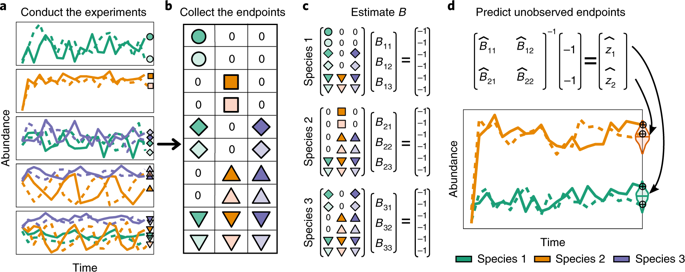当前位置:
X-MOL 学术
›
Nat. Ecol. Evol.
›
论文详情
Our official English website, www.x-mol.net, welcomes your feedback! (Note: you will need to create a separate account there.)
Predicting coexistence in experimental ecological communities.
Nature Ecology & Evolution ( IF 16.8 ) Pub Date : 2019-12-16 , DOI: 10.1038/s41559-019-1059-z Daniel S Maynard 1, 2 , Zachary R Miller 2 , Stefano Allesina 2, 3
Nature Ecology & Evolution ( IF 16.8 ) Pub Date : 2019-12-16 , DOI: 10.1038/s41559-019-1059-z Daniel S Maynard 1, 2 , Zachary R Miller 2 , Stefano Allesina 2, 3
Affiliation

|
The study of experimental communities is fundamental to the development of ecology. Yet, for most ecological systems, the number of experiments required to build, model or analyse the community vastly exceeds what is feasible using current methods. Here, we address this challenge by presenting a statistical approach that uses the results of a limited number of experiments to predict the outcomes (coexistence and species abundances) of all possible assemblages that can be formed from a given pool of species. Using three well-studied experimental systems-encompassing plants, protists, and algae with grazers-we show that this method predicts the results of unobserved experiments with high accuracy, while making no assumptions about the dynamics of the systems. These results demonstrate a fundamentally different way of building and quantifying experimental systems, requiring far fewer experiments than traditional study designs. By developing a scalable method for navigating large systems, this work provides an efficient approach to studying highly diverse experimental communities.
中文翻译:

预测实验性生态社区中的共存。
对实验群落的研究是生态学发展的基础。但是,对于大多数生态系统而言,构建,建模或分析社区所需的实验数量大大超过了使用当前方法可行的数量。在这里,我们通过提出一种统计方法来应对这一挑战,该方法使用有限数量的实验结果来预测可以从给定物种库中形成的所有可能组合的结果(共存和物种丰富度)。使用三个经过充分研究的实验系统(包括植物,原生生物和藻类与放牧者),我们证明了该方法可以高度准确地预测未观察到的实验的结果,而无需对系统的动力学做任何假设。这些结果证明了构建和量化实验系统的根本不同方式,与传统研究设计相比,所需实验数量少得多。通过开发用于导航大型系统的可扩展方法,这项工作为研究高度多样化的实验社区提供了一种有效的方法。
更新日期:2019-12-17
中文翻译:

预测实验性生态社区中的共存。
对实验群落的研究是生态学发展的基础。但是,对于大多数生态系统而言,构建,建模或分析社区所需的实验数量大大超过了使用当前方法可行的数量。在这里,我们通过提出一种统计方法来应对这一挑战,该方法使用有限数量的实验结果来预测可以从给定物种库中形成的所有可能组合的结果(共存和物种丰富度)。使用三个经过充分研究的实验系统(包括植物,原生生物和藻类与放牧者),我们证明了该方法可以高度准确地预测未观察到的实验的结果,而无需对系统的动力学做任何假设。这些结果证明了构建和量化实验系统的根本不同方式,与传统研究设计相比,所需实验数量少得多。通过开发用于导航大型系统的可扩展方法,这项工作为研究高度多样化的实验社区提供了一种有效的方法。

























 京公网安备 11010802027423号
京公网安备 11010802027423号